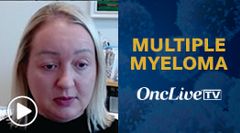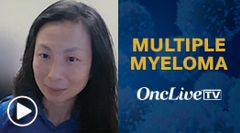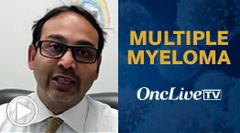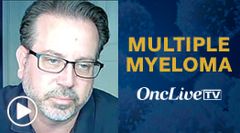
Dr Shain on the Evolving Role of Bispecific Antibodies in Multiple Myeloma Management
Kenneth Shain, MD, PhD, discusses the evolving role of bispecific antibodies in the management of multiple myeloma.
Episodes in this series

Kenneth Shain, MD, PhD, associate member, Malignant Hematology program, Department of Malignant Hematology; director, Myeloma Research Center, Moffitt Cancer Center; assistant professor, Department of Oncologic Sciences, the University of South Florida Morsani College of Medicine, discusses the evolving role of bispecific antibodies in the treatment of patients with multiple myeloma, particularly in the community setting.
During a workshop titled "Advancing Multiple Myeloma Care: From Frontline Strategies to Novel Therapies in Relapsed/Refractory Settings", Shain and colleagues focused on the advantages of bispecific antibodies as an accessible and effective therapy in the multiple myeloma treatment arsenal.
Bispecific antibodies offer a lower barrier to access, than CAR T-cell therapy, which can be more challenging to access in non-academic centers. This makes them a valuable next-line treatment option after CAR T-cell therapy or as an alternative treatment for patients who may not have access to CAR T-cell products, he explains.
Shain emphasizes that bispecific antibodies targeting BCMA and other emerging targets, such as GPRC5D, have demonstrated clinical effectiveness. These agents allow for flexible treatment sequencing, providing clinicians with the ability to tailor treatment based on patient response and durability following initial therapies, Shain states. Decisions regarding whether to switch targets or maintain the same target after CAR T-cell therapy are influenced by patient outcomes, he notes.
One key advantage of using bispecific antibodies in the community setting is their favorable safety profile, particularly with regards to cytokine release syndrome (CRS). Although CRS does occur with bispecific therapies, it is typically less severe compared than CRS events seen with CAR T-cell therapy, with most cases being grade 1/2, Shain explains.
Advances in prophylactic measures coupled with the shift from inpatient to outpatient administration of treatment have further reduced the incidence and severity of CRS, making bispecific antibodies safer and more feasible for use in the community setting.
Overall, bispecific antibodies provide community oncologists with a practical and effective therapeutic option with a manageable safety profile, Shain states. Shain concludes that these agents are becoming an increasingly integral part of the multiple myeloma treatment paradigm as their use expands beyond academic centers.










































